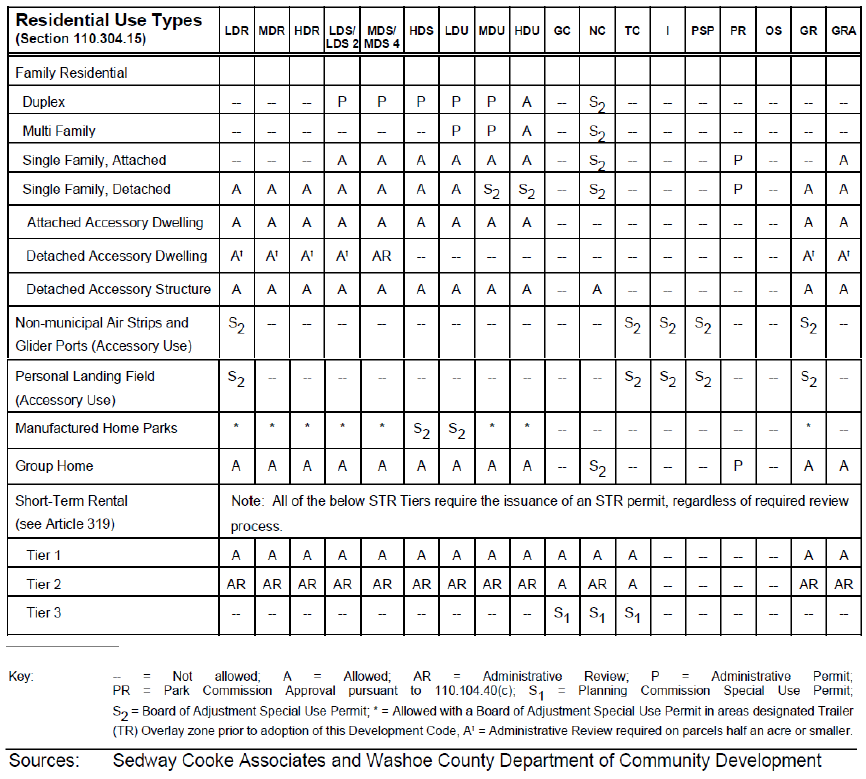The ADU Hub
Washoe County Accessory Dwelling Unit Hub
 In pursuit of the Washoe County Strategic Plan’s housing-related goals and initiatives, Washoe County has developed this informational ADU Hub for homeowners to guide the construction of accessory dwelling units (ADUs.) The Washoe County Accessory Dwelling Unit Hub includes all the information necessary for a prospective ADU owner to get started on an ADU development project in unincorporated Washoe County. The accelerator includes a series of components that together give a full picture of the ADU development process in the county. It points out key decision-making points along the way and helps you be prepared to make the decision that is right for you. Over the coming months this page will include more helpful graphics and links to useful information. Some of the features you can expect to find in the ADU Hub are:
In pursuit of the Washoe County Strategic Plan’s housing-related goals and initiatives, Washoe County has developed this informational ADU Hub for homeowners to guide the construction of accessory dwelling units (ADUs.) The Washoe County Accessory Dwelling Unit Hub includes all the information necessary for a prospective ADU owner to get started on an ADU development project in unincorporated Washoe County. The accelerator includes a series of components that together give a full picture of the ADU development process in the county. It points out key decision-making points along the way and helps you be prepared to make the decision that is right for you. Over the coming months this page will include more helpful graphics and links to useful information. Some of the features you can expect to find in the ADU Hub are:
-
Access to educational materials about financing, designing, permitting and constructing an accessory dwelling unit, including how to take advantage of manufactured units and tiny homes for an ADU project.
-
Information about the county’s pre-approved building plans program and how to know if you should consider taking advantage of a pre-approved plan.
-
Information on how local professionals from the design, contracting, manufactured home, and financing industries are beginning to focus on ADUs by learning about Washoe County’s ADU requirements and developing specialized products for ADU customers.

What is an Accessory Dwelling Unit?
Often referred to as a “mother-in-law unit” or sometimes a “granny flat,” an accessory dwelling unit, or ADU, is simply an additional dwelling unit permitted on a parcel that by design and function is clearly accessory(secondary/auxiliary/subordinate, etc.) to the Principal Dwelling unit (Primary/main residence/etc.).
An ADU may or may not be attached to the principal dwelling unit. The primary components that make up an ADU are first, it is a dwelling unit; and second it is accessory to the main dwelling unit.
Here is a closer look at these two ADU components:
1. Dwelling unit. In Washoe County, as in many jurisdictions, “dwelling unit” is defined by multiple agencies in ways that meet each agency’s unique needs. To facilitate and ease the review of ADUs in Washoe County, the primary review agencies have agreed to utilize the definition found in the Washoe County Development Code (WCDC.) The use of this definition leads to a focus on the presence of a kitchen to identify if a proposed structure is a dwelling unit.
2. Accessory. Washoe County establishes the accessory nature of an ADU through restrictions on their size relative to the principal dwelling unit. An ADU may be up to 50% of the principal dwelling unit, with an overall maximum size of 1,500 square feet (1,200 in MDS regulatory zones.)
Washoe County Development Code’s approach to regulating ADU’s:
1. WCDC Article 306, Accessory Uses and Structures. This Article provides important definitions and development standards that apply to accessory structures, including accessory dwelling units. Sections 110.306.20 and 110.306.25 provide specific standards for attached and detached ADUs.
2. Definitions are found in WCDC Article 902. The definitions of Dwelling Unit and Kitchen are:
➢ Dwelling Unit. "Dwelling unit" means any building or portion thereof, including a fabricated home or portion thereof, which contains at a minimum permanent kitchen and bathroom (i.e. a toilet) facilities for residential use types as defined in Article 304, Use Classification System, but which may also include living, sleeping, and eating facilities as required by the Development Code, the International Building Code, and/or the National Manufactured Home and Safety Standards Act.
➢ Kitchen. "Kitchen" means a room or space within a room equipped with such electrical or gas hook up that would enable the installation of a range, oven, or like appliance using 220/40 volts or natural gas (or similar fuels, such as propane) for the preparation of food, and also containing either or both a refrigerator and sink for the washing and/or disposal of food.

How do I know if my parcel is eligible for an ADU?
Zoning. Washoe County’s zoning regulations permit attached ADUs in all the county’s regulatory zones. Detached ADUs are permitted throughout most of the county. Parcels in the Medium Density Suburban zone require an additional permit called an Administrative Review.
Size. Parcels that are half an acre or smaller also require an Administrative Review. Currently in the Tahoe planning area the minimum lot size is one acre.
The Administrative Review. This review is primarily designed to ensure neighborhood compatibility. The review will look at things like location, design, and the potential need for screening. An Administrative Review is completed in-house and thus does not entail a public hearing; however, it does provide neighbors with an opportunity for comment.
Domestic Well and Septic Systems. Many parcels throughout Washoe County utilize domestic wells and individual septic systems for their water and wastewater needs. The Northern Nevada Public Health department oversees regulations that impact the ability for some of these parcels to develop an ADU. The size of the parcel, the capacity of the existing septic system, and the ability to expand the system are some of the issues NNPH will review. Broadly speaking, parcels one acre or larger can meet the NNPH thresholds required for an ADU. But the NNPH staff is the best resource to learn if a parcel without municipal wastewater services is eligible for an ADU.
Get to know your Parcel
The best way to find out if your parcel is eligible for an ADU is simply to contact staff. They can quickly help you know your parcel’s ADU eligibility. But to help you learn about your parcel, the county provides, the Washoe County Regional Mapping System (WRMS.) This easy-to-use online system is a powerful tool to investigate the details of your parcel. In addition to acreage, zoning, and municipal services, this online mapping system contains a wealth of other public information about your parcel and your neighborhood that you may find useful.
Here is some useful information regarding these key issues surrounding ADU eligibility:
• Northern Nevada Public Health Contact 775.328.2434
• Administrative Review Application. The application contains additional information about the Admin review process.
The table of uses from the Washoe County Development Code shows how zoning and lot size underly ADU eligibility.
WCDC TABLE OF USES (Residential Use Types) Table 110.302.05.1
(See Sections 110.302.10 and 110.302.15 for explanation)

What type of structure may I consider for my ADU project?
Washoe County provides significant flexibility for you to choose the type of construction for your ADU.
In fact, your ADU may consist of any unit that meets Nevada and Washoe County building codes and size standards.
Yes. Tiny Homes and Manufactured Homes are an excellent option for some homeowners when considering what type of structure to utilize for their ADU. But in Washoe County, the fact is any type of dwelling may be utilized for an ADU. Any construction type that complies with the adopted Washoe County building codes for a dwelling can be considered. Manufactured units no older than six years, tiny homes, traditional stick-built, and alternative materials stick-built structures are all permitted for use as an ADU as long as they meet the currently adopted building code. Your choice will therefore likely be a matter of issues like design, location, cost and even personal preference. An important note to keep in mind is that a Recreational Vehicle (RV) is not a dwelling, and can not be used as an ADU in Washoe County.

How do I get started on an ADU project?
Depending on the ADU project, you may find some or all of these services offered by one entity, while some projects may contract separately for these services. Also, rather than bringing all these services under one roof, some professionals are building partnerships with professionals from other fields to offer ADU packages. The key to a smooth and ultimately successful project is to work with professionals who have experience with ADUs within their field. The growing demand for ADUs is contributing to a growing number of professionals from each of these fields who are committed to helping customers navigate the ADU process with focused information and specialized products.
Staff are often asked if they can make any recommendations for a local professional in these fields. While staff does not recommend individual businesses, here are some things to consider when choosing any professional service:
1. Ensure you are communicating with a licensed professional.
2. Does the business have any expertise or experience in ADUs? As mentioned, the increasing demand for ADUs is causing many professional services to ensure they have knowledgeable staff on hand to speak with you about an ADU project. In fact, some contractors are developing a specialty in ADU construction.
3. And finally, how good is communication between you and the professional? Northern Nevada is fortunate to have many highly skilled, licensed professionals from these fields. Ultimately the most important thing is your ability to communicate with the one you choose.
Here is a further look at each of the parts of an ADU project.
1. Financing. Determining the type and source of financing is one of the critical decisions for any ADU project. Homeowners can typically choose from a variety of financing options including Home Equity loans, re-financing existing mortgages, and even cash. The appropriate financing mechanism often depends on the details of the project such as size, manufacture type, and location – all of which will impact the project budget.
Budgeting and cost estimating are usually necessary to understand the scope of the project’s financing needs. The overall cost of the project will include professional services, construction, permitting, and utility hookups. Washoe County maintains webpages to help you estimate the cost for projects requiring a building permit. These pages will help you understand how costs associated with the permitting of your project are calculated. Building Fees Estimating Project Costs
2. Design. The design of an ADU is another decision point for an ADU project. Design includes more than just choosing a style. Design incorporates features such as building materials, sustainability, site compatibility, and construction methods. An ADU can be custom designed, be a pre-approved model in the county’s Master Permit program, a manufactured home, or a tiny home. Any dwelling that meets the adopted building code in Washoe County can be utilized for an ADU. This flexibility opens the door to countless design possibilities for an ADU project and ultimately allows homeowners to choose the design that is right for them. Many architects, residential designers, manufactured home builders and other designers are responding to the increased demand for ADUs by developing specialized products for use as ADUs. Sometimes you may ask your designer to apply for the necessary permits.
3. Permitting. Obtaining the necessary permits ensures your ADU will be safe, reliable, compatible, and legally established on the parcel. At a minimum, all ADUs require either a building permit (stick built) or placement permit (manufactured.) Depending on site characteristics, some ADU projects may require a grading permit. ADU projects on parcels one-half acre or smaller and parcels with a Medium Density Suburban zoning designation will require approval of an Administrative Review prior to obtaining other permits. An administrative review is an in-house review that generally considers development constraints and neighborhood compatibility. Additional information about this process, including fees, can be found in the Administrative Review Application. Questions about this process can be found by contacting the planning program at planning@washoecounty.gov , 775.328.6100. The required permits can be submitted by the property owner or by a designated contractor, designer, or engineer. All plans submitted for permits must be stamped by an appropriately certified professional. You can find important information about the permitting process by contacting the building program at: building@washoecounty.gov, 775.328.2020.
4. Construction/Placement. Unless you are planning to apply as an “owner-builder,” it is likely your construction contractor who will be applying for the necessary permits. Some contractors may be capable of handling multiple steps of the ADU process, including design, permitting, and construction/placement. But primarily, the contractor will be responsible for making the building plans come into reality. Certified and Licensed professionals should be used throughout all the critical steps of your ADU project. This is particularly important when it comes to who is building or placing a new ADU on your parcel. Using a State of Nevada licensed professional will ensure your ADU project is safe and able to pass all the critical inspections necessary to obtain a Certificate of Occupancy.
Several things go into choosing who will construct or place your ADU. Specifically, the type of unit you choose (prefabricated, pre-approved models, stick-built units, specialty materials, add on to existing structure, etc.) will help narrow the choice of contractors for your project. As mentioned above, these are choices which are often rooted in your available budget, but may also be influenced by site characteristics, timeline, and personal preferences. Experience with similar projects and an ability to communicate should be fundamental to your choice.

What is the process for placing an ADU on my parcel?
The process of navigating these steps can feel a bit daunting at times. Fortunately, Washoe County staff are always available to help with your permitting related questions. Also, many architects, other designers, and contractors can facilitate the design/build/permitting actions that need to take place.
We hope the information provided has been helpful in moving your ADU project forward. Your remaining questions can be answered by contacting the Washoe County Planning or Building Programs, or the Norther Nevada Public Health Environmental Health Program, depending on the nature of your inquiry.
Be on the look-out for additional details on the ADU process, county permitting, and partnerships with local professionals who have agreed to become familiar with Washoe County’s ADU regulations, develop in-house ADU expertise, and in some cases offer specialized ADU products such as pre-approved plans, lending packages, or ADU focused partnerships.
We look forward to the launch of this HUB to facilitate your ADU project. In the interim, please do not hesitate to reach out Washoe County staff or a qualified local professional to learn more about what is possible for an ADU on your parcel.
If you have additional questions or would like to know more about how this information pertains to your specific property, we are happy to speak with you further. These contacts will be repeated later, but to set the stage, the primary Washoe County agency contacts regarding a potential ADU permit are:
Washoe County Planning Program – planning@washoecounty.gov. 775.328.6100, for zoning, eligibility and development standards inquiries.
Washoe County Building Program – building@washoecounty.gov. 775.328.2020, for building permit, placement permit and fee inquiries.
Northern Nevada Public Health, Environmental Health Program – healthehs@nnph.org. 775.328.2434 – for parcels that utilize domestic wells and septic systems for water and wastewater service.
